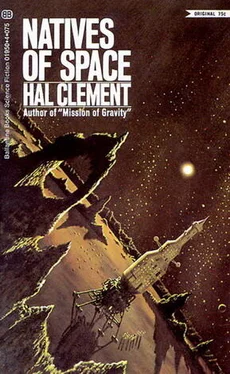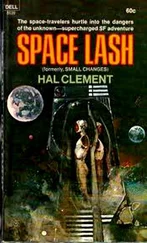He went over to the nearest of the doors and with some care examined its edge, which would be hidden when it was closed; then be beckoned to Preble. Set in the edge, almost invisible, was a half-inch circle of metal slightly different in color from the rest of the door. Itseemed perfectly flush with the metal around it. Just above the circle was a little dot of copper.
Both, objects were matched in the jamb of the door — the copper spot by another precisely similar, the circle by a shallow, bowl-shaped indentation of equal size and perhaps a millimeter deep. No means of activating the lock, if it were one, were visible. Stevenson stared at the system for several minutes, Preble trying to see around the curve of his helmet.
“It’s crazy,” the chemist said at last. “If that circle marks a bolt, why isn’t it shaped to fit the hollow on the jamb? It couldn’t be moved forward a micron, the way it is. And the thing can’t be a magnetic lock — the hollow proves that, too. You’d want the poles to fit as snugly as possible, not to have the field weakened by an air gap. What is it?”
Preble blinked, and almost bared his head in reverence, but was stopped by his helmet. “You have it, friend,” he said gently. “It is a magnetic lock. I’d bet” — he glanced at the lung dial on his wrist — “my chance of living another hundred hours that’s the story. But it’s not based on magnetic attraction — it’s magnetostriction. A magnetic field will change the shape of a piece of metal — somewhat as a strong electric field does to a crystal. They must have developed alloys in which the effect is extreme. When the current is on, that `bolt’ of yours fits into the hollow in the jamb, without any complicated lever system to move it. This, apparently, is a cargo hold, and all the doors are probably locked by one master switch — perhaps on the control board, but more probably down here somewhere. So long as a current is flowing, the doors are locked. The current in any possible storage device must have been exhausted ages ago, even if these were left locked.”
“But what about the engine-room door?” asked Stevenson. “Could that have been of this type? It was locked, remember.” Preble thought for a moment.
“Could be. The removable block might have been a permanent magnet that opposed another when it was in one way, and reinforced it when it was reversed. Of course, it would be difficult to separate them once they were placed in the latter position; maybe the ship’s current was used to make that possible. Now that the current is off, it may be that there will be some difficulty in returning that block to its original position. Let’s go and see.” He led the way back along the corridor to the ramp.
Cray received the theory with mingled satisfaction and annoyance; he should, he felt, have seen it himself. He had already discovered that the triangular blocks had developed an attachment for heir new positions, and had even considered magnetism in that connection; but the full story had escaped him. He had had other things to worry about, anyway.
The free-lance seekers had met the engineer at the entrance to the engine room. Now the three moved inside, stepping out onto a catwalk similar to that in the control room. This chamber, however, was illuminated only by the hand torches of the men; and it was amazing to see bow well they lit up the whole place, reflecting again and again from polished metal surfaces.
When one had seen the tube arrangement from outside the ship, it was not difficult to identify most of the clustered machines. The tube breeches, with their heavy injectors and disintegrators, projected in a continuous ring around the walls and in a solid group from the forward bulkhead.
Heavily insulated leads ran from the tubes to the supplementary cathode ejectors. It seemed evident that the ship had been driven and steered by reaction jets of heavy-metal ions, as were the vessels ofhuman make. All the machines were incased in heavy shields, which suggested that their makers were not immune to nuclear radiation.
“Not a bad layout,” remarked Preble. “Found out whether they’ll run?”
Cray glared. “No!” he answered almost viciously. “Would you mind taking a look at their innards for us?”
Preble raised his eyebrows, and stepped across the twenty-foot space between the catwalk and the nearest tube breech. It was fully six feet across, though the bore was probably not more than thirty inches — the walls had to contain the windings for the field which kept the ion stream from actual contact with the metal. The rig which was presumably the injector-distintegrator unit was a three-foot bulge in the center, and the insulated feed tube led from it to a nearby fuel container.
The fuel was probably either mercury or some other easily vaporized heavy metal, such as lead.
All this seemed obvious and simple enough, and was similar in basic design to engines with which even Preble was familiar; but there was a slight departure from convention in that the entire assembly, from fuel line to the inner hull, appeared to be one seamless surface of metal.
Preble examined it closely all over, and found no trace of a joint.
“I see what you mean,” he said at last, looking up. “Are they &l the same?” Cray nodded.
“They seem to be. We haven’t been able to get into any one of them — even the tanks are tight.
They look like decent, honest atomics, but we’ll never prove it by looking at the outside.”
“But how did they service them?” asked Stevenson. “Surely they didn’t weld the cases on and hope their machines were good enough to run without attention. That’s asking too much, even frcm a race that built a hull that could hold air as long as this must have.”
“How could I possibly know?” grcwled Cray. “Maybe they went outside and crawled in through the jets to service ‘em — only I imagine it’s some trick seal like the door of this room. After all, that was common sense, if you look at it right. The fewer moving parts, the less wear. Can anyone think of a way in which this breech mechanism could be fastened on, with an invisible joint, working from the same sort of common sense?”
Why no one got the answer then will always remain a mystery; but the engineer was answered by nothing but half a dozen thought expressions more or less hidden in space helmets. He looked around hopefully for a moment, then shrugged his shoulders. “Looks like we’ll just have to puzzle around and hope for the best,” he concluded. “Jack and Don might as well go back to their own snooping — and for Heaven’s sake, if you get any more ideas, come arunnin’.”
After glancing at Grant for confirmation of the suggestion, Preble and Stevenson left the engine room to continue their interrupted tour. “I wonder if the upper section behind the control room is sealed,” remarked the chemist as they entered the darkness of the corridor. “I think we’ve covered the bow fairly well.” Preble nodded; and without further speech they passed through the control chamber, glancing at the board which had given Grant and McEachern such trouble, and found, as they expected, ramps leading up and down opening from the rear corridor just as one entered.
They stayed together this time, and climbed the star-board spiral. The door at the top opened easily, which was some relief; but the hallway beyond was a disappointment. It might have been any of the others already visited; and a glance into each of the rooms revealed nothing but bare metal gleaming in the flashlight beams, and dust-covered floors. The keel corridor was also open; but here was an indication that one, at least, of the rooms had been used for occupancy rather than cargo.
Stevenson looked into it first, since it was on the side of the corridor he had taken. He instantly called hi; companion, and Preble came to look at the object standing in the beam of the chemist’s light.
Читать дальше












